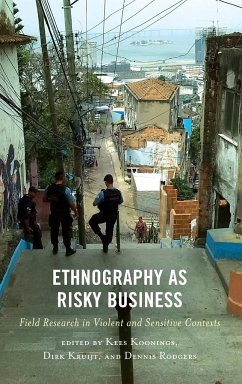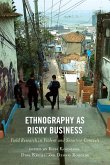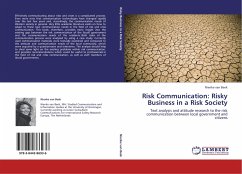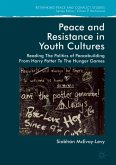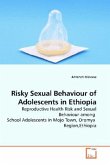Ethnography as Risky Business
Field Research in Violent and Sensitive Contexts
Ethnography as Risky Business
Field Research in Violent and Sensitive Contexts
- Gebundenes Buch
- Merkliste
- Auf die Merkliste
- Bewerten Bewerten
- Teilen
- Produkt teilen
- Produkterinnerung
- Produkterinnerung
Ethnography as Risky Business addresses how to carry out ethnographic fieldwork on socio-political conflict and collective violence with a focus on the global south. Drawing on real-life case studies, it reflects on key methodological problems and the ethical and personal challenges faced when conducting and reporting on "risky" ethnography.
Andere Kunden interessierten sich auch für
![Ethnography as Risky Business Ethnography as Risky Business]() Ethnography as Risky Business54,99 €
Ethnography as Risky Business54,99 €![Risk Communication: Risky Business in a Risk Society Risk Communication: Risky Business in a Risk Society]() Nienke van BeekRisk Communication: Risky Business in a Risk Society38,99 €
Nienke van BeekRisk Communication: Risky Business in a Risk Society38,99 €![Peace and Resistance in Youth Cultures Peace and Resistance in Youth Cultures]() S. McEvoy-LevyPeace and Resistance in Youth Cultures104,99 €
S. McEvoy-LevyPeace and Resistance in Youth Cultures104,99 €![Risky Sexual Behaviour of Adolescents in Ethiopia Risky Sexual Behaviour of Adolescents in Ethiopia]() Anteneh MelesseRisky Sexual Behaviour of Adolescents in Ethiopia32,99 €
Anteneh MelesseRisky Sexual Behaviour of Adolescents in Ethiopia32,99 €![Risky Discourse Risky Discourse]() tanisha jowseyRisky Discourse44,99 €
tanisha jowseyRisky Discourse44,99 €![Living is Risky Living is Risky]() Felix M BerardoLiving is Risky18,99 €
Felix M BerardoLiving is Risky18,99 €![Beyond Social Capital Beyond Social Capital]() Laura K. GrahamBeyond Social Capital38,99 €
Laura K. GrahamBeyond Social Capital38,99 €-
-
-
Ethnography as Risky Business addresses how to carry out ethnographic fieldwork on socio-political conflict and collective violence with a focus on the global south. Drawing on real-life case studies, it reflects on key methodological problems and the ethical and personal challenges faced when conducting and reporting on "risky" ethnography.
Hinweis: Dieser Artikel kann nur an eine deutsche Lieferadresse ausgeliefert werden.
Hinweis: Dieser Artikel kann nur an eine deutsche Lieferadresse ausgeliefert werden.
Produktdetails
- Produktdetails
- Verlag: Lexington Books
- Seitenzahl: 254
- Erscheinungstermin: 26. April 2019
- Englisch
- Abmessung: 235mm x 157mm x 20mm
- Gewicht: 568g
- ISBN-13: 9781498598439
- ISBN-10: 1498598439
- Artikelnr.: 55319156
- Herstellerkennzeichnung
- Libri GmbH
- Europaallee 1
- 36244 Bad Hersfeld
- gpsr@libri.de
- Verlag: Lexington Books
- Seitenzahl: 254
- Erscheinungstermin: 26. April 2019
- Englisch
- Abmessung: 235mm x 157mm x 20mm
- Gewicht: 568g
- ISBN-13: 9781498598439
- ISBN-10: 1498598439
- Artikelnr.: 55319156
- Herstellerkennzeichnung
- Libri GmbH
- Europaallee 1
- 36244 Bad Hersfeld
- gpsr@libri.de
Kees Koonings is associate professor of anthropology and development studies in the Department of Cultural Anthropology at Utrecht University and professor of Brazilian studies at CEDLA, University of Amsterdam. Dirk Kruijt is professor emeritus of development studies in the Department of Cultural Anthropology at Utrecht University, research fellow at the Center for International Studies of the University Institute of Lisbon, and research fellow at the Centre for Military Studies, Stellenbosch University. Dennis Rodgers is research professor in the Department of Anthropology and Sociology at the Graduate Institute of International and Development Studies and visiting professor in international development studies at the University of Amsterdam.
Introduction: Ethnography as 'Risky Business' Chapter 1: Researching the
Politics of Aid in War-torn Societies: The Case of Chalatenango, El
Salvador Chapter 2: Dealing with Distrust: A Diplomat-Anthropologist
Negotiating Obstacles in Politically Sensitive Urban Fieldwork in Sudan
Chapter 3: Researching security in Africa as the "Sierra Foxtrot Golf"
Chapter 4: A Wolf in Sheep's Clothing: Negotiating Identity in Fieldwork
Among the National Civil Police in Guatemala Chapter 5: "Doctor, How Can We
Improve Our Image in Europe?": Researching War and Peace in Colombia as an
Ethnographer-Consultant Chapter 6: Interviewing Revolutionary Generations
in Latin America: A Personal Memoir Chapter 7: "You are not like the
Ladinos at all": Reflections on Fieldwork, Cataloguing the Researcher and
Knowledge Production Chapter 8: Keeping a Distance? Dealing With
Perpetrators of Violence in a Guatemalan Town Chapter 9: From 'Broder' to
'Don': Methodological Reflections on Longitudinal Gang Research in
Nicaragua Chapter 10: Interpretation of Dreams and Humor in Affective
Fieldwork on State Violence in Argentina Chapter 11: Swimming with Former
Combatants: Ethics and Pragmatics of Fieldwork in Post War zones in Sri
Lanka Chapter 12: Ethical Issues Raised by Legal Anthropological Research
on Local Dispute Settlement in Ecuador Chapter 13: Security at Stake:
Dealing with Violence and Public (In)security in a Popular Neighborhood in
Guadalajara, Mexico Chapter 14: Among Comrades: (Dis)trust in Ethnographic
Fieldwork with Former Salvadoran Revolutionaries Chapter 15: Embedded
Ethnography: Conflict Research Through an International Peace Mission in
Colombia Chapter 16: Fieldwork Frontiers: Danger, Uncertainty, and
Limitations During Research with Former Combatants in Mozambique
Politics of Aid in War-torn Societies: The Case of Chalatenango, El
Salvador Chapter 2: Dealing with Distrust: A Diplomat-Anthropologist
Negotiating Obstacles in Politically Sensitive Urban Fieldwork in Sudan
Chapter 3: Researching security in Africa as the "Sierra Foxtrot Golf"
Chapter 4: A Wolf in Sheep's Clothing: Negotiating Identity in Fieldwork
Among the National Civil Police in Guatemala Chapter 5: "Doctor, How Can We
Improve Our Image in Europe?": Researching War and Peace in Colombia as an
Ethnographer-Consultant Chapter 6: Interviewing Revolutionary Generations
in Latin America: A Personal Memoir Chapter 7: "You are not like the
Ladinos at all": Reflections on Fieldwork, Cataloguing the Researcher and
Knowledge Production Chapter 8: Keeping a Distance? Dealing With
Perpetrators of Violence in a Guatemalan Town Chapter 9: From 'Broder' to
'Don': Methodological Reflections on Longitudinal Gang Research in
Nicaragua Chapter 10: Interpretation of Dreams and Humor in Affective
Fieldwork on State Violence in Argentina Chapter 11: Swimming with Former
Combatants: Ethics and Pragmatics of Fieldwork in Post War zones in Sri
Lanka Chapter 12: Ethical Issues Raised by Legal Anthropological Research
on Local Dispute Settlement in Ecuador Chapter 13: Security at Stake:
Dealing with Violence and Public (In)security in a Popular Neighborhood in
Guadalajara, Mexico Chapter 14: Among Comrades: (Dis)trust in Ethnographic
Fieldwork with Former Salvadoran Revolutionaries Chapter 15: Embedded
Ethnography: Conflict Research Through an International Peace Mission in
Colombia Chapter 16: Fieldwork Frontiers: Danger, Uncertainty, and
Limitations During Research with Former Combatants in Mozambique
Introduction: Ethnography as 'Risky Business' Chapter 1: Researching the
Politics of Aid in War-torn Societies: The Case of Chalatenango, El
Salvador Chapter 2: Dealing with Distrust: A Diplomat-Anthropologist
Negotiating Obstacles in Politically Sensitive Urban Fieldwork in Sudan
Chapter 3: Researching security in Africa as the "Sierra Foxtrot Golf"
Chapter 4: A Wolf in Sheep's Clothing: Negotiating Identity in Fieldwork
Among the National Civil Police in Guatemala Chapter 5: "Doctor, How Can We
Improve Our Image in Europe?": Researching War and Peace in Colombia as an
Ethnographer-Consultant Chapter 6: Interviewing Revolutionary Generations
in Latin America: A Personal Memoir Chapter 7: "You are not like the
Ladinos at all": Reflections on Fieldwork, Cataloguing the Researcher and
Knowledge Production Chapter 8: Keeping a Distance? Dealing With
Perpetrators of Violence in a Guatemalan Town Chapter 9: From 'Broder' to
'Don': Methodological Reflections on Longitudinal Gang Research in
Nicaragua Chapter 10: Interpretation of Dreams and Humor in Affective
Fieldwork on State Violence in Argentina Chapter 11: Swimming with Former
Combatants: Ethics and Pragmatics of Fieldwork in Post War zones in Sri
Lanka Chapter 12: Ethical Issues Raised by Legal Anthropological Research
on Local Dispute Settlement in Ecuador Chapter 13: Security at Stake:
Dealing with Violence and Public (In)security in a Popular Neighborhood in
Guadalajara, Mexico Chapter 14: Among Comrades: (Dis)trust in Ethnographic
Fieldwork with Former Salvadoran Revolutionaries Chapter 15: Embedded
Ethnography: Conflict Research Through an International Peace Mission in
Colombia Chapter 16: Fieldwork Frontiers: Danger, Uncertainty, and
Limitations During Research with Former Combatants in Mozambique
Politics of Aid in War-torn Societies: The Case of Chalatenango, El
Salvador Chapter 2: Dealing with Distrust: A Diplomat-Anthropologist
Negotiating Obstacles in Politically Sensitive Urban Fieldwork in Sudan
Chapter 3: Researching security in Africa as the "Sierra Foxtrot Golf"
Chapter 4: A Wolf in Sheep's Clothing: Negotiating Identity in Fieldwork
Among the National Civil Police in Guatemala Chapter 5: "Doctor, How Can We
Improve Our Image in Europe?": Researching War and Peace in Colombia as an
Ethnographer-Consultant Chapter 6: Interviewing Revolutionary Generations
in Latin America: A Personal Memoir Chapter 7: "You are not like the
Ladinos at all": Reflections on Fieldwork, Cataloguing the Researcher and
Knowledge Production Chapter 8: Keeping a Distance? Dealing With
Perpetrators of Violence in a Guatemalan Town Chapter 9: From 'Broder' to
'Don': Methodological Reflections on Longitudinal Gang Research in
Nicaragua Chapter 10: Interpretation of Dreams and Humor in Affective
Fieldwork on State Violence in Argentina Chapter 11: Swimming with Former
Combatants: Ethics and Pragmatics of Fieldwork in Post War zones in Sri
Lanka Chapter 12: Ethical Issues Raised by Legal Anthropological Research
on Local Dispute Settlement in Ecuador Chapter 13: Security at Stake:
Dealing with Violence and Public (In)security in a Popular Neighborhood in
Guadalajara, Mexico Chapter 14: Among Comrades: (Dis)trust in Ethnographic
Fieldwork with Former Salvadoran Revolutionaries Chapter 15: Embedded
Ethnography: Conflict Research Through an International Peace Mission in
Colombia Chapter 16: Fieldwork Frontiers: Danger, Uncertainty, and
Limitations During Research with Former Combatants in Mozambique

